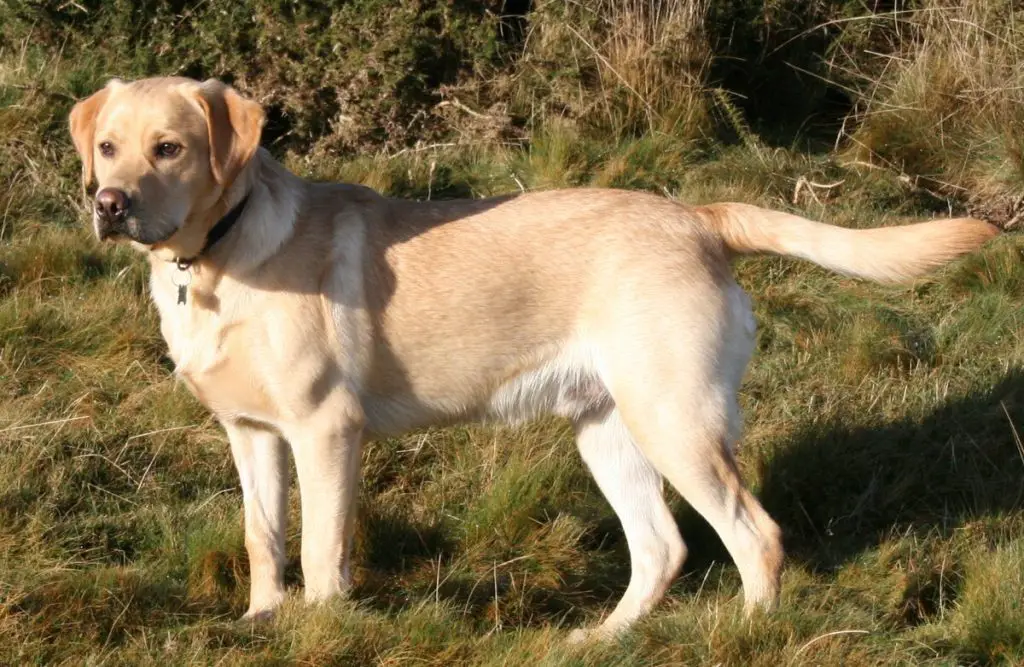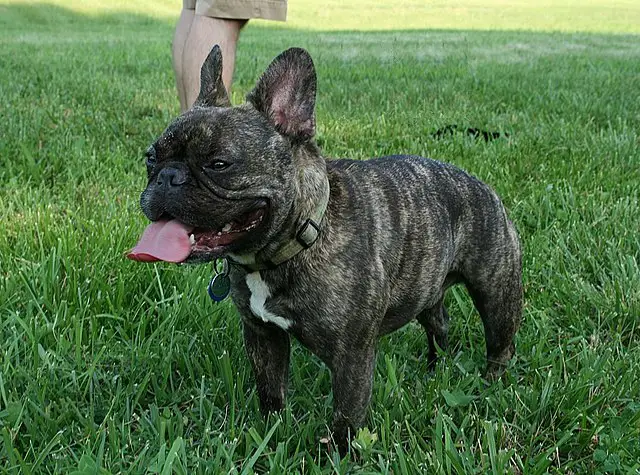The Great Dane is a large German breed of domestic dog known for its massive size and noble appearance. According to the American Kennel Club, Great Danes are one of the tallest dog breeds, with males standing at least 30 inches at the shoulder and females 28 inches and up. Despite their giant size, Great Danes are known for being friendly, patient and dependable companions. They have a long and regal history as hunting dogs used by European nobles, earning them the nickname “Apollo of dogs”. Great Danes make loyal family pets but require regular exercise and space due to their large stature. Their short coats come in colors like fawn, brindle, black and blue. With proper training and socialization, Great Danes can be calm housemates and devoted protectors.
Loyalty
Loyalty in dogs refers to their natural instinct to form strong bonds with their caregivers and display unwavering devotion. Dogs are known to be one of the most loyal domesticated animals. According to Purina, canine loyalty stems from their ancestral relationship with humans, as dogs were domesticated over thousands of years to work together with people. This cooperation promoted loyalty traits through selective breeding.
Loyal dogs will typically show affection, obedience, and protective behaviors towards their owners and family. They aim to please their humans and prefer to be in close proximity. As pack animals, dogs view their human family as their pack and remain faithful to the hierarchical structure. According to Daily Paws, loyal dogs exhibit attachment through behaviors like responding appropriately to commands, barking at potential threats, and showing excitement upon an owner’s return.
Breed Traits
Great Danes are known for their intelligence, trainability, and gentle temperament despite their massive size. According to the AKC (AKC), Great Danes score above average in intelligence compared to other dog breeds. Their trainability stems from their eagerness to please their owners. With positive reinforcement training methods, Great Danes can learn basic commands and even more advanced tricks.
In terms of temperament, the Great Dane breed tends to be patient, loyal, and affectionate with their family members. They form strong bonds with their owners. Great Danes aim to please and enjoy being involved in family activities. Despite their imposing physical presence, Great Danes are not aggressive by nature. According to Hill’s Pet (Hill’s Pet), their typical temperament is described as friendly and devoted.
Bonding Ability
Great Danes are known for forming exceptionally strong bonds with their human families. According to the Great Dane Dog Breed Information & Characteristics, Great Danes are affectionate, loyal dogs who are good with children. Their gentle and devoted nature makes them wonderful family companions.
One of the top reasons Great Danes make such great family pets is their innate desire to be close to their people. As pack animals, Great Danes thrive when they can be in constant contact with their human “pack.” According to Do Great Danes like to cuddle?, cuddling and bonding is key to a Great Dane’s happiness and helps them become a well-adjusted dog.
Overall, Great Danes form very close attachments to their families. Their exceptional bonding ability, combined with their gentle demeanor, makes them ideal pets for households with children.
Protective Instinct
Great Danes can be very protective of their family and home. While not typically used as guard dogs, Great Danes have a strong instinct to guard and protect their loved ones if needed 1. Due to their intimidating size and deep, booming bark, most people will think twice before approaching a wary Great Dane. Though very social dogs, Great Danes can show protective behaviors such as barking at strangers, standing between their family and a perceived threat, or using their body to block access to their home or family members 2.
While Great Danes have protective instincts, they are not typically aggressive dogs. With proper socialization and training, Great Danes can learn when to activate their protective behaviors and when to stand down. Their primary instinct is to guard, not attack. However, Great Danes will defend their family members if they perceive a true threat. Their size and strength alone can be a significant deterrent to potential intruders.
Real-Life Examples
Great Danes are known for their gentle demeanor and loyalty. There are many real-life stories that demonstrate their protective instincts and devotion to their owners. For example, a Great Dane named Matthew courageously saved his owner from an attack, showcasing his loyalty and bravery (https://www.mammothoutlet.com/blog/great-dane-saves-owner-from-attack/). The strong bond between Great Danes and their owners is also evident in this inspiring true story of the deep love shared between a woman and her Great Dane (https://booktrib.com/2022/12/01/a-true-inspiring-story-of-the-love-between-dog-and-owner/). These real-life examples provide proof of the Great Dane’s capacity for unwavering loyalty and their desire to keep their loved ones safe from harm.
Training
One of the keys to reinforcing loyalty in Great Danes is through proper training. Great Danes are highly intelligent and generally easy to train, though they can be stubborn at times (https://blog.tryfi.com/great-dane-protective-loyal-companion/). Consistency and positive reinforcement are important when training a Great Dane. Start socialization and obedience training early on as a puppy to build trust and respect. Use reward-based methods, providing treats and praise when your Great Dane exhibits good behavior. Some important commands to teach are “come,” “stay,” and “heel” in order to establish control. Practice these commands in various settings and do not give up if your Great Dane does not obey immediately. With persistent, gentle training a strong bond will form leading to a loyal and devoted companion. Provide mental stimulation as well with interactive toys and varying walking routes and activities to prevent boredom. A well-exercised and stimulated Great Dane that sees its owner as a fair, trusted leader is more likely to be loyal and obedient. While Great Danes can be stubborn, taking the time to properly train them will bring out their naturally loyal instincts (https://blog.tryfi.com/great-dane-training-tips/).
Health Factors
Great Danes are prone to certain health issues, like cardiomyopathy, bloat, and bone cancer, that can shorten their lifespan and affect their quality of life if not properly managed (AKC). However, these health problems do not seem to impact their loyal temperament when cared for appropriately. With diligent health testing, regular veterinary care, proper nutrition, exercise, and medication as needed, Great Danes with health issues can still be loving, devoted companions.
For example, a Great Dane with cardiomyopathy that is managed through medication, diet, moderate exercise, and regular checkups, can live a fairly normal life and form strong bonds with their family. Their loyalty and desire to protect and please their owners remains highly intact. While health issues may limit their activeness somewhat, they adjust and find fulfillment through bonding.
With their shorter lifespan, Great Danes strive to maximize their devoted years with their families. Their loyal spirit helps them overcome health challenges. When cared for properly, Great Danes with health problems remain steadfast, affectionate guardians until the very end.
Comparison to Other Breeds
The Great Dane is known as a particularly loyal breed, but how does its loyalty compare to other famously loyal dog breeds like the German Shepherd or Mastiff? According to Chewy’s breed comparison of the Great Dane and Mastiff, Great Danes are very loyal to their owners and affectionate. However, the Mastiff may be slightly more protective due to its history as a guard dog. Both the Mastiff and Great Dane aim to keep their owners in sight at all times. Meanwhile, the German Shepherd is an intensely loyal breed that bonds very closely with its owner. Its loyalty and trainability have made it a popular police and military working dog. However, the Great Dane’s easygoing nature can mean it forms a less intense bond. The Great Dane shows its loyalty through its devotion, trust, and desire to be close to its owner. While it may not serve as fervently as a German Shepherd, its loyalty and gentle protectiveness make it an excellent companion.
Conclusion
In summary, Great Danes are known to be an extremely loyal dog breed. Their gentle giant nature, strong bonding ability with family members, and protective instincts all contribute to their reputation for loyalty.
As we’ve discussed, Great Danes form especially close bonds with their family and are eager to please and affectionate with their owners. They are devoted companions who crave human interaction. With proper socialization and training, Great Danes utilize their size and protective nature to watch over their family members.
While no dog is 100% guaranteed to be loyal, Great Danes exhibit many traits that characterize loyal dog breeds. Their large stature and need for companionship mean they do best when thoroughly trained and made to feel like part of the family. Overall, the Great Dane’s loyalty, gentle spirit, and desire to guard its loved ones make this breed one of the most loyal dog breeds out there.


